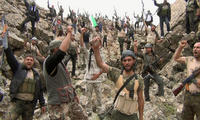-
Identifying, thwarting insider threats before they do damage
Researchers argue that one way to identify and predict potential insider threats even before these individuals begin to do damage like stealing and leaking sensitive information, is by using Big Data to monitor changes in behavior patterns. Researchers at PARC, for example, found that individuals who exhibit sudden decrease in participation in group activity, whether in a game like World of Warcraft or corporate e-mail communications, are likely to withdraw from the organization. A withdrawal represents dissatisfaction with the organization, a common trait of individuals who are likely to engage in insider security breaches.
-
-
Israeli defense company launches cybersecurity solutions section
In recent months the Israel Aerospace Industries (IAI) has increased its cyberdefense-related activities. Esti Peshin, director of the company’s cyber section and a veteran of the IDF’s hush-hush sigint Unit 8200, says IAI is now developing solutions for clients in Israel and abroad. “We’re a start-up, but with the backing of a company that earns $3.5 billion a year,” she said. Ultimately, she implied, these defensive measures can be turned into offensive capabilities. “Intelligence is a subset of attack,” Peshin said. “This is, first of all, a national mission.”
-
-
New cyber-attack model helps hackers time the next Stuxnet
Taking the enemy by surprise is usually a good idea. Surprise can only be achieved if you get the timing right — timing which, researchers argue, can be calculated using a mathematical model, at least in the case of cyber-wars. The researchers say that based on the stakes of the outcome, a cyberweapon must be used soon (if stakes are constant) or later (if the stakes are uneven). In other words, when the gain from a cyberattack is fixed and ramifications are low, it is best to attack as quickly as possible. When the gain is high or low and ramifications are high, it is best to be patient before attacking.
-
-
New technologies make police work more effective
Law enforcement officers across the country are adapting to new technologies which aim to improve efficiency and accuracy on the job. The average police car is now equipped with a laptop which provides access to national criminal databases, portable fingerprint scanners, Breathalyzer units, automatic license-plate-readers, and even printers that can print out a citation ticket. Experts stress that while technology has equipped law enforcement officers with sophisticated resources, officers must not abandon old-fashioned practices like maintaining a personal connection with the communities they serve.
-
-
Torrential rain, hurricane-force winds, floods continue to batter U.K.
Torrential rains, floods, and winds with speeds reaching 108 mph continue to batter south and west U.K., causing massive disruptions to power supply and road and rail transportation. Britain is enjoying a short respite today (Thursday), but meteorologists warned people to brace themselves for more chaos as another storm brings heavy rain, strong winds, and more risk of flooding on Friday and into the weekend. Severe flood warnings, indicating danger to life, remain in place in Berkshire, Surrey, and Somerset, where hundreds of homes have been evacuated.
-
-
Unmanned aerial logistics system to bypass ground-based threats, challenges
Rugged terrain and threats such as ambushes and Improvised Explosive Devices (IEDs) can make ground-based transportation to and from the front lines a dangerous challenge. Combat outposts require on average 100,000 pounds of material a week, and high elevation and impassable mountain roads often restrict access. Unmanned aerial logistics system would bypass ground-based threats and enable faster, more effective delivery of cargo and other essential services in hard-to-reach areas.
-
-
Portland’s Christmas Bomber challenges NSA-gathered evidence used to convict him
Mohamed Mohamud, a Somali immigrant and former Oregon State University student, was convicted last year of attempting to detonate a bomb in 2010 near Portland’s Christmas holiday tree-lighting ceremony at Pioneer Courthouse Square. His lawyers are questioning the legality of evidence used against him. Attorneys for Mohamud are claiming that the evidence used was obtained without a warrant and should have been barred by the court.
-
-
Israeli legal expert urges development of ethics code for cyberwarfare
Col. Sharon Afek, former deputy military advocate general, says that countries would benefit from developing an ethics code to govern cyber warfare operations. He notes that existing law already prohibits cyber operations which would directly lead to loss of life, injury, or property damage, such as causing a train to derail or undermining a dam. “Israel faces a complex and challenging period in which we can expect both a cyber arms race with the participation of state and non-state entities, and a massive battle between East and West over the character of the future legal regime,” he writes. He acknowledges, though, that only a catastrophic event like “Pearl Harbor or Twin Towers attack in cyberspace” would accelerate developments in this area.
-
-
Wal-Mart effect: Decline in crime rates slower where Wal-Mart builds

Communities across the United States experienced an unprecedented decline in crime in the 1990s. For counties where Wal-Mart built stores, however, the decline was not nearly as dramatic. A new study examines crime rate in 3,109 U.S. counties in the 1990s, a time of dynamic growth and expansion for Wal-Mart and falling crime rates nationally. During that decade, Wal-Mart expanded in 767 of those counties. The researchers show that Wal-Mart tended to expand in counties with higher than average crime rates, and with numerous crime-related predicators, such as poverty, unemployment, immigration, population structure, and residential turnover. The researchers speculate that much of this relationship occurred because Wal-Mart finds better success building in communities that are less likely to protest the company’s arrival.
-
-
Security of dirty bomb materials in U.S. inadequate: experts
There are more than 5,000 medical and research devices in the United States containing high-activity radiation sources, including 700 with category-1 sources. Category-1 radiation material could be used by terrorists in dirty bombs. The security measures developed by the industry were written with accident prevention in mind, not in order to thwart a deliberate, forcible effort by terrorists or criminals to gain control of the toxic material. In addition, radioactive materials were considered to be “self-protecting,” because it was assumed that the powerful radiation would deter anyone thinking of tampering with these devices. Terrorist bomb-makers, however, showed themselves to be more technologically-savvy than earlier thought, and, in any event, suicide bombers would not be deterred by the risk of radiation poisoning.
-
-
Nevada trial of Sikh terrorist postponed by two years to clarify FISA-related issues
Balwinder Singh, 39, who received asylum in the United States in 1997, was indicted as a member of Babbar Khalsa International (BKI) and Khalistan Zindabad Force (KZF). Both groups use bombings, kidnappings, and murders in a campaign to establish an independent Sikh state in the Punjab region of India, to be called Khalistan. U.S. District Judge Larry Hicks agreed with the prosecution and defense that the trial should be postponed from February 2014 to February 2016 so that issues related to FISA-authorized NSA surveillance of Singh could be clarified. Judge Hicks said that “the ends of justice served by this continuance outweighs the defendant’s and public’s best interests in a speedy trial.”
-
-
Most of Libya’s chemical weapons destroyed
When Libya joined the Chemical Weapons Convention in December 2003, it reported to the Organization for the Prohibition of Chemical Weapons (OPCW) that it was operating three chemical-weapons production facilities, and that it had produced a total of twenty-five tons of sulfur mustard gas, 3,563 bombs with warfare agents, and 1,390 tons of precursor materials. Over the next eight years, these chemical weapons stock were systematically destroyed under international supervision. The work was halted between February and November 2011 – the beginning of the rebellion against Qaddafi and his departure from power – and resumed in early 2012. OPCW announced than on 26 January 2014, work on destroying Libya’s mustard gas has been completed. The question is whether the Qaddafi regime was truthful in its 2003 declaration – or whether there are still stocks of chemical agents stashed somewhere in desert caches.
-
-
FBI monitors Americans back from fighting in rebel ranks in Syria

Western intelligence services estimate that 2,100 Europeans and seventy Americans have fought in Syria. U.S. intelligence officials report that some of these Americans have returned to the United States and are under FBI surveillance. There is a concern that individuals who have been trained by al-Qaeda affiliates will ultimately use their battlefield experience to launch attacks in the United States.
-
-
First full-system mechanical environment test of B61-12 nuke completed successfully
The U.S. National Nuclear Security Administration (NNSA) announced the successful completion of the first full-system mechanical environment test of the B61‑12 as part of the NNSA’s effort to refurbish the B61 nuclear bomb. This first full-system mechanical environment test is one of several critical milestones for the B61-12 Life Extension Program (LEP). The B61-12 will replace the existing B61-3, -4, -7, and -10 bombs. Fielding the B61-12 will also enable the retirement of the B83, the last U.S. megaton class weapon, in the mid-to-late 2020s.
-
-
U.S. Navy probes exam cheating at school for nuclear power reactor operator
Yet another military service is facing allegations of exam-cheating. Earlier this year, the U.S. Air Force launched a probe into a cheating scandal involving about 100 officersat Malmstrom Air Force Base, Montana, who are responsible for maintaining and operating land-based nuclear missiles. Now the U.S. Navy is investigating about one-fifth of its trainers at the school for naval nuclear power reactor operators in Charleston, South Carolina. The sailors are accused of cheating on written tests required to obtain certification as instructors at the nuclear propulsion school.
-
More headlines
The long view
Why Was Pacific Northwest Home to So Many Serial Killers?
By Jacob Sweet
Ted Bundy, Gary Ridgway, George Russell, Israel Keyes, and Robert Lee Yates were serial killers who grew up in the Pacific Northwest in the shadow of smelters which spewed plumes of lead, arsenic, and cadmium into the air. As a young man, Charles Manson spent ten years at a nearby prison, where lead has seeped into the soil. The idea of a correlation between early exposure to lead and higher crime rates is not new. Fraser doesn’t explicitly support the lead-crime hypothesis, but in a nimble, haunting narrative, she argues that the connections between an unfettered pollution and violent crime warrant scrutiny.
Bookshelf: Smartphones Shape War in Hyperconnected World
By Kathryn Brimblecombe-Fox
The smartphone is helping to shape the conduct and representation of contemporary war. A new book argues that as an operative device, the smartphone is now “being used as a central weapon of war.”
